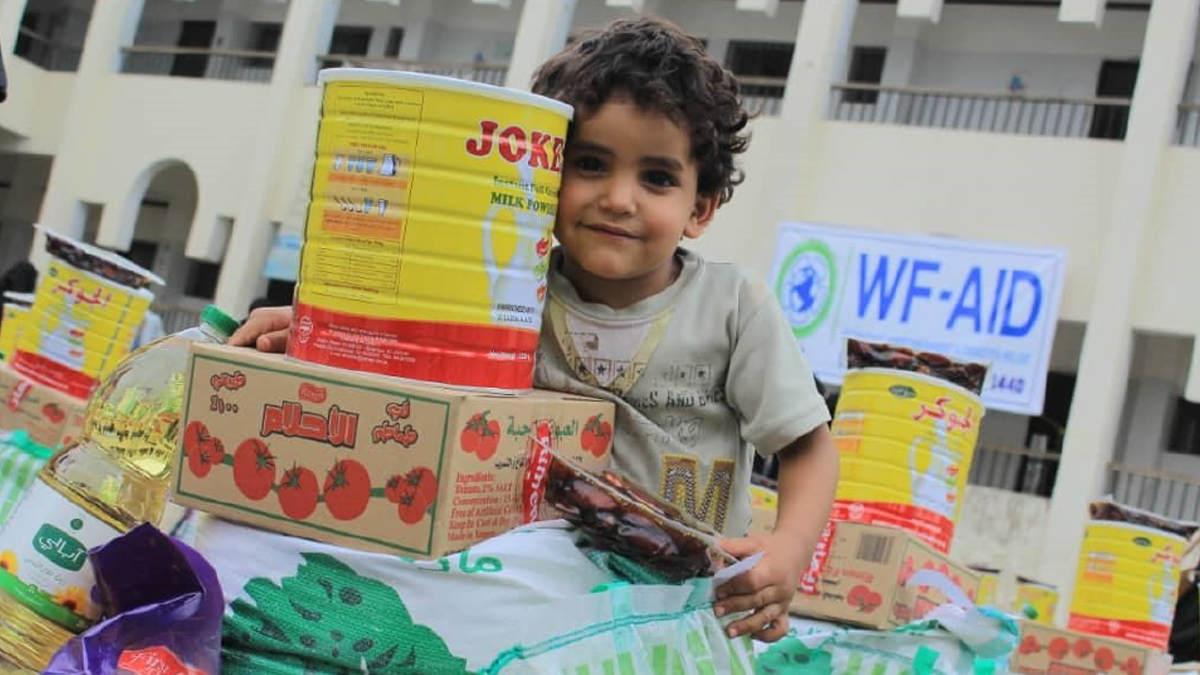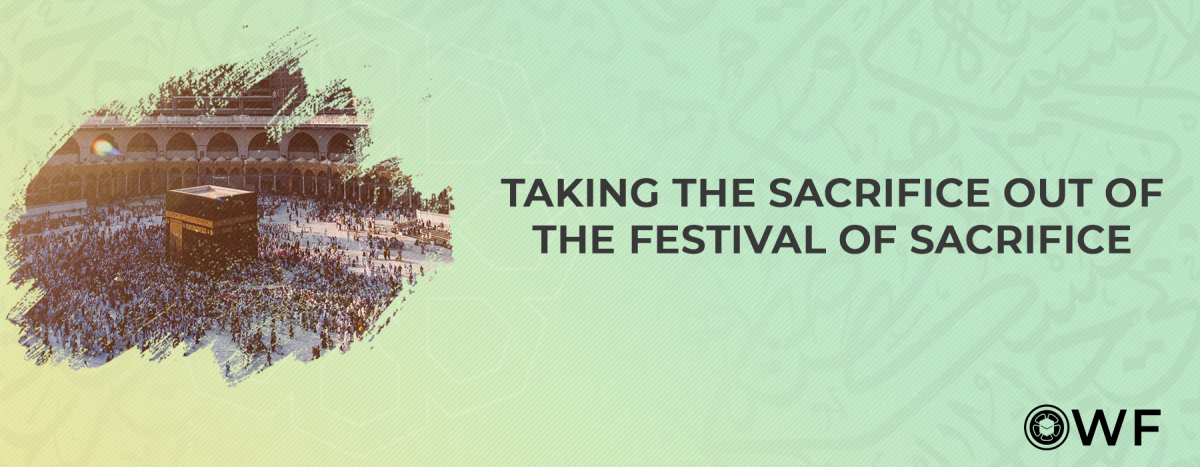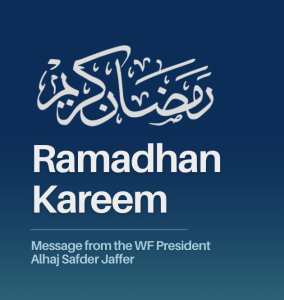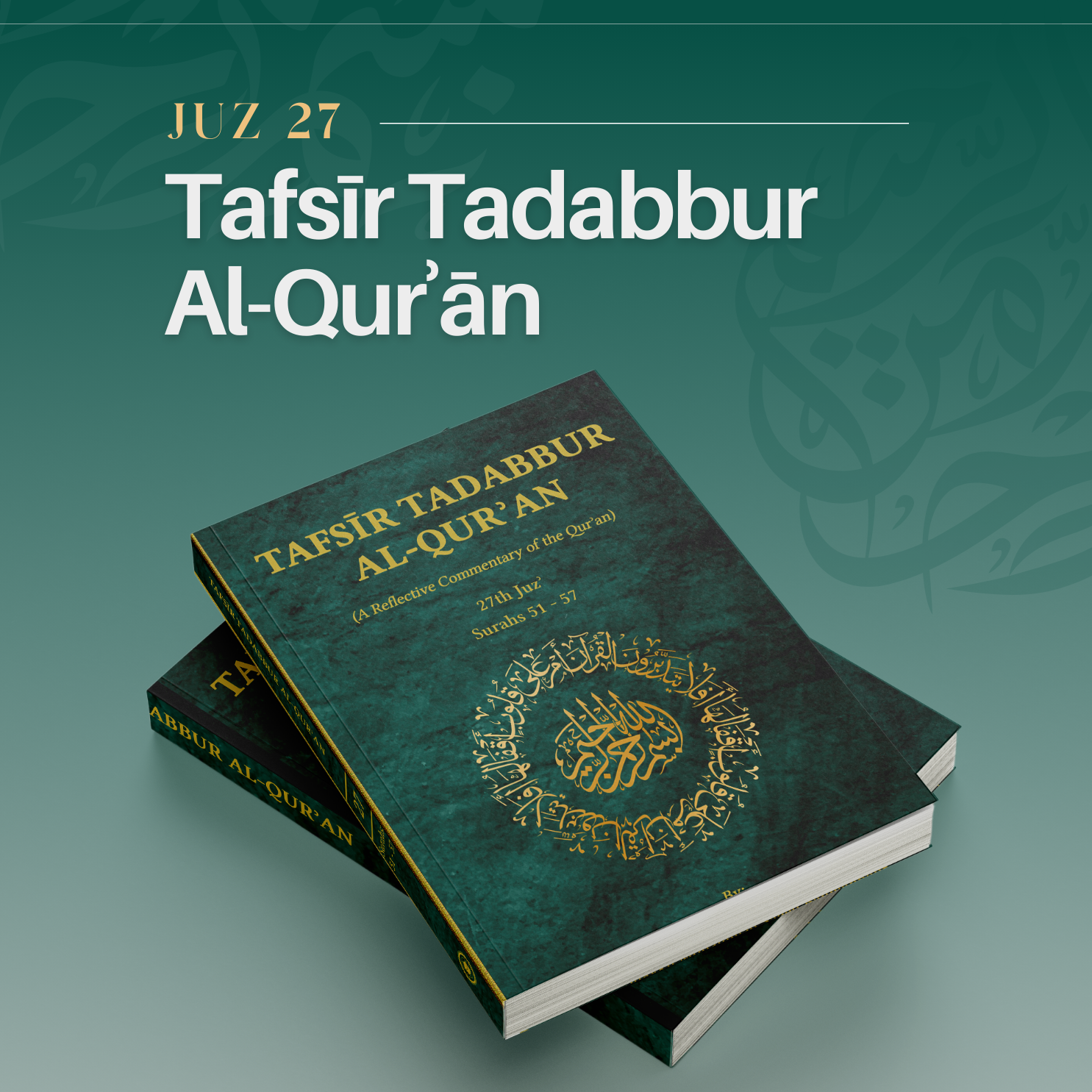When he was old enough to assist in his endeavor, he said, ‘My son! I see in a dream that I am sacrificing you. See what you think.’ He said, ‘Father! Do whatever you have been commanded. If Allah wishes, you will find me to be patient.’
So when they had both submitted and he had laid him down on his forehead,
We called out to him, ‘O Abraham! You have indeed fulfilled the vision! Thus indeed do We reward the virtuous! This was indeed a manifest test.’
Then We ransomed him with a great sacrifice …
(37:100-107)
Introduction
Eid al-Adha, the Festival of Sacrifice, is a cornerstone of Islamic tradition, celebrated by millions of Muslims worldwide. Central to this festival is the practice of sacrifice, the ritual sacrifice of an animal, which serves as a profound act of devotion and a means to provide for the less fortunate. In recent years, a reform-minded statement has been issued that questioned the necessity of this ritual and proposed alternatives that align more closely with modern sensibilities, such as animal rights and environmental concerns – arguing that the traditional practice of animal sacrifice can be replaced with other forms of charity. [1]
This article will critically examine the arguments presented in this statement in support of such a position and demonstrate that they ignore the specific nature of the obligation of sacrifice. By dissecting the claims that animal sacrifice is substitutable and exploring the deeper purposes of this ritual, it aims to reaffirm the importance of maintaining this tradition in the face of contemporary challenges.
Background
Eid al-Adha and Sacrifice
Eid al-Adha, also known as the Festival of Sacrifice, is one of the most significant holidays in the Islamic calendar. It commemorates the willingness of Prophet Ibrahim (a) to sacrifice his son Isma’il (a) in obedience to God’s command. However, God provided a ram to sacrifice instead, symbolizing divine mercy and grace. This act of sacrifice is re-enacted by Muslims worldwide through the ritual of sacrifice, where an animal, usually a sheep, goat, cow, or camel, is slaughtered. The meat from this sacrifice is distributed among family, friends, and the needy, ensuring that the blessings of Eid reach all layers of society. Sacrifice is not just a ritual; it is a profound expression of faith, obedience, and charity, underscoring the values of sacrifice, gratitude, and communal responsibility in Islam. This practice is deeply rooted in the religious and cultural fabric of Muslim communities and is explicitly mentioned in the Qur’an and traditions, reinforcing its significance in Islamic tradition.
Recent Debate
In recent years, the ritual of animal sacrifice during Eid al-Adha has come under scrutiny from various quarters, including animal rights activists, vegetarians, vegans, and environmentalists. This scrutiny has sparked a broader discussion within the Muslim community about potential alternatives to the traditional practice. A notable instance of this debate was initiated by a statement proposing that, in light of contemporary concerns, it might be permissible to substitute the sacrificial offering with other forms of charity or community service that could provide equal or greater benefit to society. This suggestion has stirred significant controversy, as it challenges a practice that is not only deeply rooted in Islamic tradition but also explicitly mandated by religious texts. The statement’s stance has raised important questions about the interpretation of Islamic law and the potential for reform in religious practices, prompting a critical examination of the arguments for and against maintaining the ritual of animal slaughter.
Argument 1: Animal Sacrifice is Substitutable
The statement argues that the animal sacrifice during Hajj can be substituted with an alternative offering of equal or greater value, based on modern needs and priorities. It notes that, according to verse 2:196, one who cannot perform the sacrifice in Mina may, instead, fast for three days during Hajj and seven when he or she returns home. The verse states:
“… And whoever cannot find [or afford such an animal] – then a fast of three days during Hajj and of seven when you are returned [home]…”
However, the statement’s interpretation is problematic for several reasons. Firstly, the exception mentioned in this verse applies to specific circumstances, such as financial inability or unavailability of animals. These exceptions do not imply that the sacrifice itself is substitutable under normal conditions. Meanwhile, the hadith in question and juristic opinion do not invoke substituting the sacrifice with anything else but rather articulate leniency regarding how it can be performed.
Furthermore, the traditions cited in the statement – that indicate that it is permissible to appoint someone else to perform the sacrifice for you, that the sequential order in which the sacrifice is performed in relation to other rites of Hajj can be adjusted, or that in exceptional circumstances the sacrifice can be performed outside of Mina – that do not have anything to do with the substitutability of animal sacrifice.
Secondly, the argument conflates the concept of wajib takhyiri (substitutable or optional obligations) – which with that of ta’yini (non-substitutable or fixed obligations). In Islamic jurisprudence, takhyiri refers to duties where one has options to choose from, such as the expiation (kaffara) for certain offenses, which allows for various forms of compensation (e.g., fasting, feeding the poor, freeing a slave). On the other hand, ta’yini refers to fixed obligations that cannot be substituted, much like the daily prayers that cannot be replaced by other acts of worship. The statement’s implicit claim that animal sacrifice falls under the category of takhyiri is unfounded, as the Qur’an and hadith do not support the idea that sacrifice can be casually replaced by other offerings.
The statement mistakes the sequence of duties and their potential substitutes (badal) in the obligation of sacrifice for unconditional substitution. In reality, the obligation of sacrifice is an example of a sequential duty, similar to the kaffara murattaba for involuntary manslaughter, where the prescribed actions must be attempted in a specific order, only moving to the next option if the first is not feasible. This does not imply a general substitutability but rather a structured approach to fulfilling an obligation.
Moreover, the very verse (2:196) used by the statement to argue for sequential substitutability of the sacrifice presents the same sort of obligation for the ritual of shaving of the head, stating:
“If one of you is ill or is suffering because of some ailment in your head, you must redeem the shaving of the head by fasting, or paying money in charity, or offering a sacrifice.”
If we were to follow the logic of the statement, it would suggest that one could skip the head shaving entirely and choose any of the redemption options directly, one of which is sacrifice. Thus the result of ignoring the structured and sequential nature of such Islamic rituals is an outcome counter to the objective of the author.
Argument 2: The Purpose of Animal sacrifice
The statement posits that the wisdom (hikma) of animal sacrifice during Eid al-Adha is twofold: to glorify God and serve the needy. It then argues that the first component of the wisdom of sacrifice is outdated, and the second component can be achieved through other means. To make the former point, it cites verse 22:37, which states:
“It is not their flesh or their blood that reaches God. Rather it is your Godwariness that reaches Him. Thus has He disposed them for your benefit so that you may magnify God for His guiding you. And give good news to the virtuous.”
According to the statement, this verse indicates that the essence of the ritual is not in the act of slaughter itself but rather to glorify God in the context of a pagan Arabian society that sacrificed to its own gods.
It then uses verse 22:36 to argue that the other wisdom behind slaughter is to feed the needy. The verse states: “When it is slaughtered, consume its flesh and give part of it to the needy who do and those do not ask for help from others.” The statement then proposes that this wisdom can be achieved by way of modern alternatives, such as donating money or other resources to the needy, which fulfill the same spiritual and social functions. There are a number of issues with this:
Firstly, this argument elevates the perceived wisdom to the status of the cause (‘illa) [2] of the obligation of sacrifice – when the cause of a ruling and the wisdom behind it are two different things. [3] It assumes that, when such wisdom can be achieved in other ways, the obligation is no longer binding. And this is a dangerous precedent. Unlike its cause, the absence of the original wisdom does not nullify the obligation of a religious duty. Applying this logic broadly could lead to the abandonment of numerous essential practices.
For instance, the Qur’an mentions various wisdoms behind rituals like prayer (salat) and fasting (sawm), such as promoting piety, self-discipline, and remembrance of God. Yet, these rituals remain obligatory regardless of whether these outcomes can be achieved through other activities.
Furthermore, the first component of wisdom (glorifying God) is still relevant even today. It is not merely a matter of “establishing monotheism”, as the author claims. Indeed, the very same phrase (li tukabbiru Allaha ‘ala ma hadakum) is used in the context of fasting in verse 2:185, and no one would argue that the obligation of fasting is particular to the context of seventh-century Arabia.
Secondly, the argument that the needs of the pilgrims and the poor can be met in other ways does not negate the particular value of sacrifice. The Qur’an explicitly commands the act of sacrifice [4], and the Prophet (saw) and Imams (a) reportedly emphasized its importance:
The Prophet (saw) was asked: “O Messenger of Allah, Eid al-Adha is approaching and I do not have the price of the sacrifice, should I borrow and sacrifice?” He said: “Borrow [and sacrifice], for it is a debt that will be repaid.” [5]
Imam al-Rida (a), was asked: “May we be sacrificed for you, the sacrifices have become dear to us in Makkah, is it permissible for two people to share in one sheep?” He said: “Yes, and for seventy [people].” [6]
These traditions show that the act of sacrificing is of the utmost importance, because if it could have been substituted with an act of charity, the Prophet (saw) and Imams (a) would have told their followers to give what they can rather than encouraging them to borrow money for a sacrificial animal or share one between themselves.
During the Farewell Pilgrimage (hajjat al-wada), the Blessed Prophet (saw) brought one hundred sacrificial animals, more than thirty of which were designated for Imam Ali (a) [7], demonstrating his great commitment. Imam al-Bāqir (a) stated, “Indeed, God, Immaculate is He, loves the shedding of blood [of sacrifices], feeding of food, and aiding the distressed” [8], highlighting the importance of sacrifice and assisting the hungry and needy. Also, and Imams (a) reportedly emphasized its importance, even telling believers to borrow money for it. [9] Were there no intrinsic value in sacrifice outside of it being another form of charity, such statements would not make sense.
Further, the statement utilizes a hadith attributed to Imam Sadiq (a) that permits taking the meat outside of Mina due to the affluence of the community to bolster his idea that, today, the community can be supported in ways other than sacrifice. However, this hadith does not imply that the ritual itself can be replaced. Rather, the flexibility in distribution addresses logistical concerns while still upholding the value of this specific ritual.
In conclusion, while the goals of worshipping God and serving the needy are paramount, the specific act of animal sacrifice during Eid al-Adha holds significant ritualistic and symbolic importance that cannot be replaced by alternative forms of charity. The statement’s proposal fails to appreciate the full religious and spiritual dimensions of sacrifice.
Conclusion
The recent debate on substituting the traditional animal sacrifice during Eid al-Adha with alternative forms of charity raises important questions about the interpretation of Islamic rituals and the potential for religious reform. However, the arguments put forth by the statement overlook the specific nature of the obligation of sacrifice. Animal sacrifice is deeply embedded in the Islamic tradition, commemorating Prophet Ibrahim’s ultimate act of devotion and obedience to God. It is not merely a means to support the needy but an act of worship with intrinsic spiritual value.
The statement’s arguments based on exceptions and the misinterpretation of Islamic jurisprudential concepts do not justify a general substitutability of sacrifice. Moreover, the reliance on the perceived wisdom behind the ritual, rather than its explicit religious command, sets a precarious precedent that could undermine the integrity of other fundamental Islamic practices.
While modern concerns about animal rights and environmental sustainability are valid, these should be addressed in ways that respect and preserve the core tenets of Islamic faith. Efforts to enhance the welfare of animals and to reduce waste can be integrated into the practice of sacrifice without abandoning the ritual itself. The dual purpose of sacrifice—to honor God and to support the needy—remains relevant and essential.
Moreover, this shows how reformist approaches, such as those suggested in the statement, often fail to reinterpret religious texts by imposing modern values that cannot objectively be read into them. Simplistic replacements or modifications risk eroding these rich traditions, leading to a loss of identity and continuity within the faith community.
In conclusion, the practice of animal sacrifice during Eid al-Adha should be upheld as a vital religious obligation that embodies the principles of faith, obedience, and charity. By maintaining this tradition, the Muslim community reaffirms its commitment to the teachings of the Qur’an and the Prophet (saw), ensuring that the values of Islam are preserved for future generations.




















